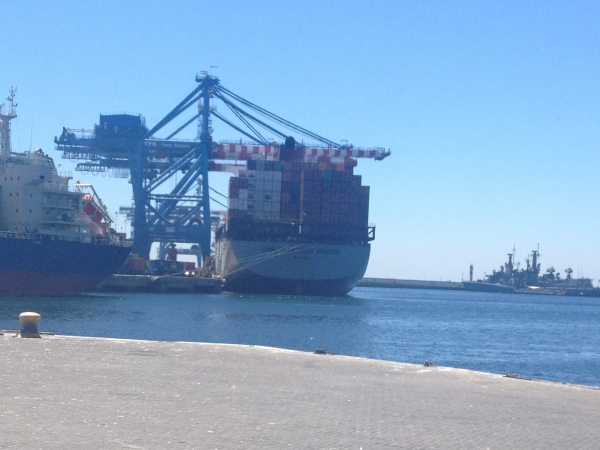Port Performance and Strategy is the theme of the 8th volume of the scholarly journal Research in Transportation Business and Management. PortEconomics members Mary Brooks and Athanasios Pallis edit this special issue that contains 21 port studies presenting state of the art research on port governance, organisation and performance.
Why this issue?
Advancements in port governance, organization and performance have been significant over the last two decades.
As Brooks and Pallis, had noted in the examination of the port literature to 2000 (Classics in Port Policy and Management, Edward Elgar, 2012), “this is a young field, only coming into its own in the last decade.” While port policy on the part of governments was a post–World War II interest, the flowering of the field really began with the development of new public management principles in the late 1980s and the resulting wave of port governance reform in the early and mid-1990s.
In the last two decades, scholars studying ports developed multidisciplinary research streams and produced a maturing research field, Given the international character of the sector, and not least the nature of the changes that shape modern ports, port researchers initiated international collaborations in order to identify research gaps and challenges, develop common research themes, and then jointly apply meaningful research approaches across broader port samples and link port studies with developing concepts in other areas of management.
In this vein, in 2001, researchers active in the International Association of Maritime Economists (IAME) with a research interest in the study of port economics, government port policy and port management applications formed a special interest group of the association, the Port Performance Research Network (PPRN). Since then, the activities of the PPRN have focused on port governance reform and port performance, and their attendant implications for port management.
This volume of Research in Transportation Business and Management builds on, updates and extends previous output published by PPRN members. For example, PPRN members examined port developments in 14 countries linking them with port performance, publishing the results in 26 articles in Research in Transportation Economics (edited Brooks and Cullinane, 2007). Two special issues were published in the scholarly journals Journal of Transport Geography and Maritime Policy and Management, the first dealing with institutional issues in shaping port governance and organization (edited by Ng, Hall and Pallis, 2012), and the second examining port concessions (edited by Notteboom, Pallis and Farrell, 2012).
All three themes are revisited in the volume by those studying port governance and port strategies respectively, and extended in new and novel ways. In this editorial, we introduce the three sections of this volume, identifying for you the contribution the individual articles make separately before we discuss the areas where more research is needed.
Port Studies in the issue
- Mary R. Brooks, Athanasios A. Pallis, Advances in port performance and strategy, 1-6.
- Hesham M. Ghashat, Kevin P.B. Cullinane, The future governance structure of Libya’s container ports: A survey of stakeholder attitudes, 7-16.
- Cassia Bömer Galvão, Leo Tadeu Robles, Luciana Cardoso Guerise, The Brazilian seaport system: A post-1990 institutional and economic review, 17-29.
- Jasmine Siu Lee Lam, Adolf K.Y. Ng, Xiaowen Fu, Stakeholder management for establishing sustainable regional port governance, 30-38.
- Angela Stefania Bergantino, Enrico Musso, Francesco Porcelli, Port management performance and contextual variables: Which relationship? Methodological and empirical issues, 39-49.
- Gordon Wilmsmeier, Beatriz Tovar, Ricardo J. Sanchez, The evolution of container terminal productivity and efficiency under changing economic environments, 50-66.
- Yi-Chih Yang, Wei-Min Chang, Impacts of electric rubber-tired gantries on green port performance, 67-76.
- Claudio Ferrari, Pier Paolo Puliafito, Alessio Tei, Performance and quality indexes in the evaluation of the terminal activity: A dynamic approach, 77-86
- Mary R. Brooks, Tony Schellinck, Measuring port effectiveness in user service delivery: What really determines users’ evaluations of port service delivery? 87-96.
- Peter W. de Langen, Kristina Sharypova, Intermodal connectivity as a port performance indicator, 97-102.
- Larissa van der Lugt, Michaël Dooms, Francesco Parola, Strategy making by hybrid organizations: The case of the port authority, 103-113.
- Francesco Parola, Salvatore Maugeri, Origin and taxonomy of conflicts in seaports: Towards a research agenda, 114-122.
- Marcella De Martino, Luisa Errichiello, Alessandra Marasco, Alfonso Morvillo, Logistics innovation in Seaports: An inter-organizational perspective, 123-133.
- Francesco Parola, Giovanni Satta, Lara Penco, Giorgia Profumo, Emerging Port Authority communication strategies: Assessing the determinants of disclosure in the annual report, 134-147.
- Michaël Dooms, Larissa van der Lugt, Peter W. de Langen, International strategies of port authorities: The case of the Port of Rotterdam Authority, 148-157.
- Alfred J. Baird, Acquisition of UK ports by private equity funds, Research in Transportation Business & Management, 158-165.
- Sheila Farrell, Private equity in UK ports: An alternative view, 166-169.
- Alfred J. Baird, Private equity in UK ports: Rejoinder to ‘an alternative view’, 170.
- Michaël Dooms, Elvira Haezendonck, Toon Valaert, Dynamic green portfolio analysis for inland ports: An empirical analysis on Western Europe. 171-185.
- Adolf K.Y. Ng, Shu-Ling Chen, Stephen Cahoon, Ben Brooks, Zaili Yang, Climate change and the adaptation strategies of ports: The Australian experiences, 186-194.
- Sara Cepolina, Hilda Ghiara, New trends in port strategies. Emerging role for ICT infrastructures, 195 -205.
For an overview of the issue, read here.












